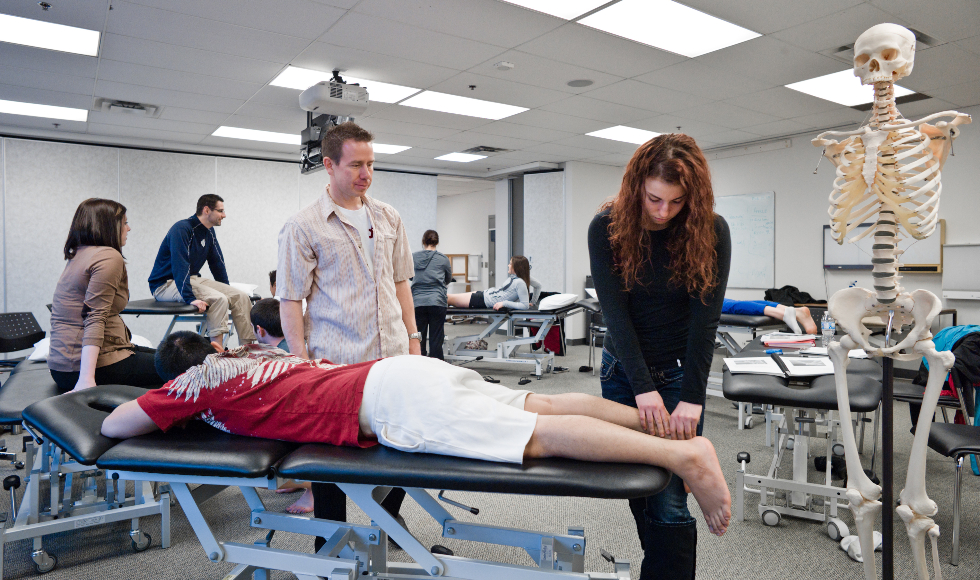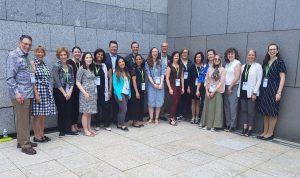School of Rehabilitation Science, CanChild celebrate 30th anniversaries

Physiotherapy students in the School of Rehabilitation Science in 2012. Photo by Ron Scheffler.
McMaster’s School of Rehabilitation Science and the CanChild Centre for Childhood Disability Research are both celebrating their 30th anniversaries this year – three decades in which the reputations of both the school and the research centre have grown internationally, boasting innovative faculty members who are leaders in their field.
Paying it forward
Sarah Wojkowski says she is overwhelmed by the gratitude she feels towards McMaster’s School of Rehabilitation Science.
“I don’t have enough words to explain the impact of the School of Rehabilitation Science to my development as a person and the opportunities it has afforded me in terms of a career,” said Wojkowski, who hails from Sarnia and has a BSc in kinesiology ’00 from McMaster. “I am who I am because of McMaster.”
Wojkowski is an assistant professor and director of clinical education for the master’s physiotherapy program with the school, as well director of the interprofessional education and research program with the Faculty of Health Sciences.
She said being offered a research assistant position as a new graduate from the physiotherapy program was fundamental in shaping her career trajectory.
Now, she wants to pay it forward.
“If someone asks if they have a minute to talk because they are struggling, I am more than happy to take the time because someone took the time with me.”
From 20 students to more than 550
McMaster’s School of Rehabilitation Science grew from a diploma program in occupational therapy and physiotherapy offered by Mohawk College, followed with a degree completion program at McMaster. Both incorporated the problem-based, small group learning model pioneered by McMaster’s medical school.
Funded with a $1.1 million grant from the Ontario government, the new school offered second degree programs in occupational therapy and physiotherapy. Initially there were 30 students in each of the two programs, which started classes in September 1990.
The school’s staff and faculty moved into the new Mohawk-McMaster Institute for Applied Health Sciences on McMaster’s main campus in 2000.
Today, McMaster’s School of Rehabilitation has 578 students in graduate programs including occupational therapy, physiotherapy, speech language pathology, rehabilitation science and health management.
“The great thing about McMaster is that all of these programs are under one umbrella in the School of Rehabilitation Science,” said Dina Brooks, vice-dean and executive director, and professor in the School of Rehabilitation Science at McMaster. “It fosters an interdisciplinary environment where people are always working together. It’s not like that in many places.”
Looking ahead, Brooks said there will be a focus on potentially offering undergraduate courses introducing students to rehabilitation and stronger collaborations with other departments within McMaster.
Developing stronger communications channels to share the news about the events and research coming from the school is also something Brooks hopes to achieve.
“I want to shine a light on the very important work that we are doing, which will help grow our relationships and partnerships with the community,” she said.
30 years of childhood disability research

Within the School of Rehabilitation Science, there’s also another 30th anniversary being celebrated.
The CanChild Centre for Childhood Disability Research, which is dedicated to generating knowledge and transforming lives of children and youth with disabilities and their families, was founded in 1989 by Mary Law, professor emerita of the school, and Peter Rosenbaum, professor of pediatrics at McMaster.
CanChild started off small, with Rosenbaum and Law, another researcher, two research coordinators and a secretary. Success and growth followed.
“We were one of the first research centres in the world to have a partnership with families and with clinicians,” said Law. “We worked actively with clinicians and families with children with disabilities on research teams, guiding our research and suggesting research questions, so it was a real partnership. I think because of that, our research was much more meaningful and it moved into practice more quickly.”
CanChild has remained a world leader in the field of childhood disability, with a core group of 15 scientists at McMaster and an additional 65 associate members worldwide.
“It is an exciting time for CanChild, with many scientists who started as trainees here now becoming the leaders,” said Jan Willem Gorter who is director of CanChild, professor in the Department of Pediatrics and an associate member of the School of Rehabilitation Science at McMaster.
“Child disability research remains at our core, but we’ve broadened our scope to include more chronic health conditions across child health research, as well supporting the health of children across their life course.”
Looking ahead, Gorter said he would like to see CanChild learnings available in developing countries.
“Developing and promoting our research is key, but at the same time, it’s about transforming lives,” said Gorter. “We are very successful in reaching a lot of children and their families in Canada and in the developed world, but I really see us looking to fill a global health need. There’s a huge population in need of the knowledge and tools we have generated to provide evidence-based services in developing countries.”


